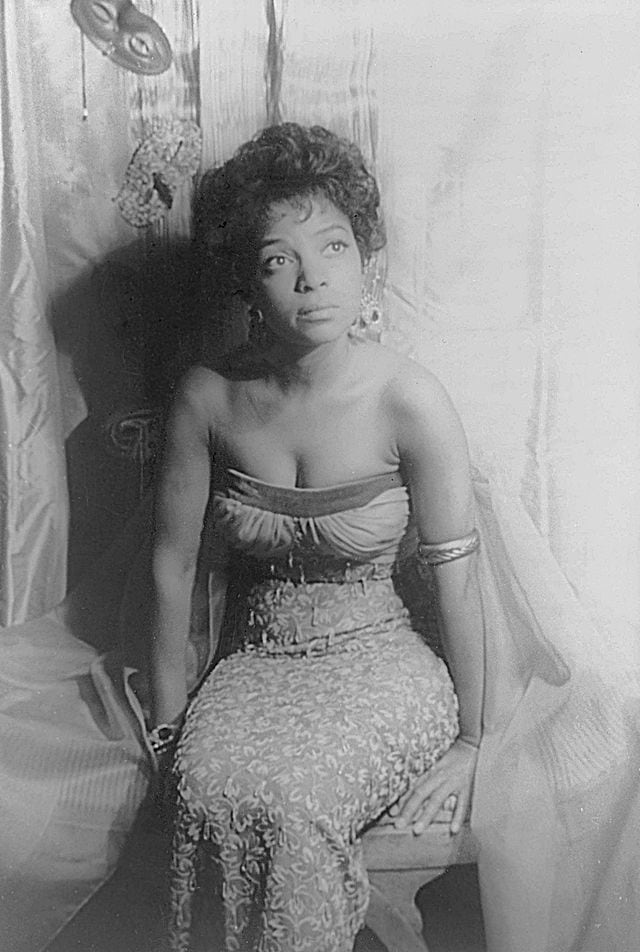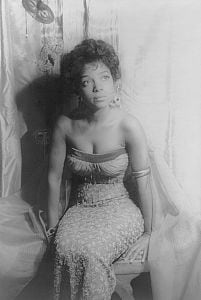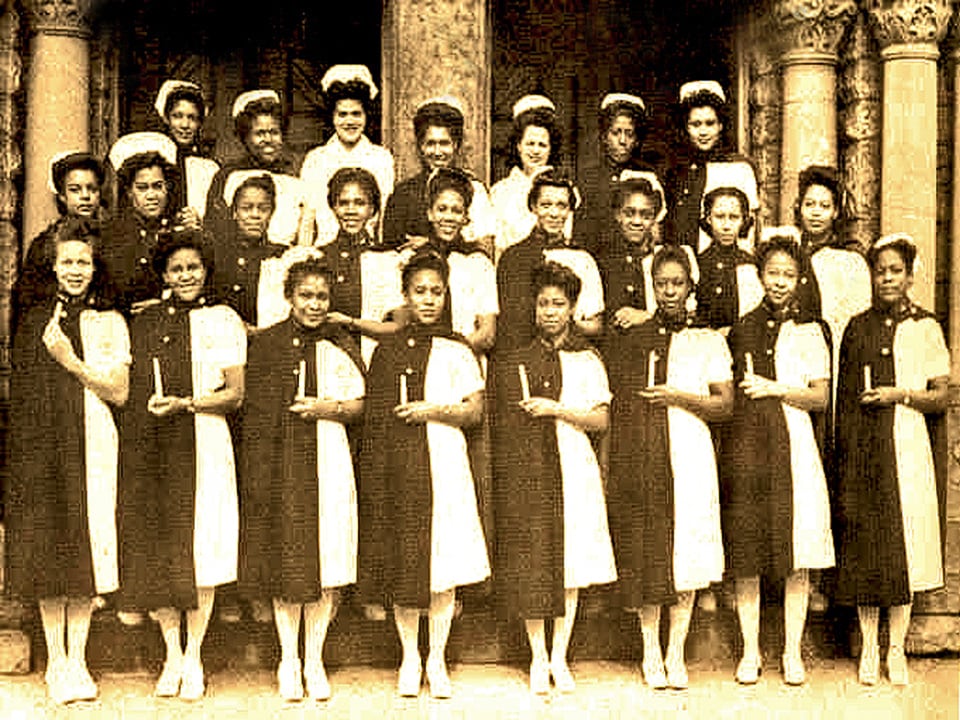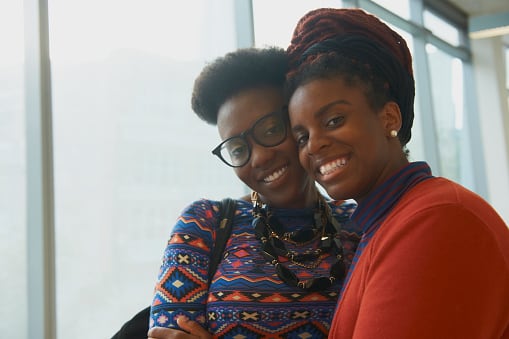Whenever I saw Ruby Dee and Ossie Davis, they played off their enduring marriage as if it were no big deal. They had clearly settled into the nooks and crannies of each other’s lives, but you could still see the adoration in their eyes — especially when Davis gazed at Dee. Like many people, I wanted to know what was in the secret sauce. The couple gave us a taste, by sharing their love lessons in a joint autobiography, With Ossie and Ruby: In This Life Together.
Dee and Davis kept it moving, while others might have been content to go sit down and take a well-earned rest. They kept acting and acting up over injustices. They took supporting roles on screen — “doing the right thing” for filmmaker Spike Lee more than once — and on behalf of causes near and dear to them, like Davis’ alma mater, Howard University. Sometimes Dee joined her husband on campus visits; I wish she had been with Davis when he spoke to one of my classes.
The last time I saw Dee was at a performance of “Gem of the Ocean” on Broadway to benefit the School of Communications. I wondered if Phylicia Rashad felt a little extra pressure that day with Dee, and Davis, in the audience. After all, Dee lived on stage. With all of her film, TV and other credits, the stage is where Dee really came into her own. She made her mark in so many plays: Anna Lucasta, A Raisin in the Sun, King Lear, The Glass Menagerie and Jeb, where she met Davis in 1946. She also did a one-woman show, My One Good Nerve: A Visit With Ruby Dee, and wrote a companion book.
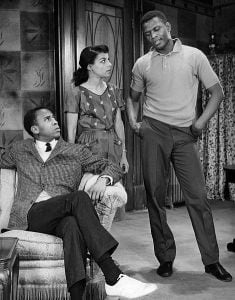
Ruby Dee in 1959 with Sidney Poitier and Louis Gossett Jr. in “A Raisin in the Sun.” (Public Domain)
You could see and hear her theatrical training in everything, even interviews and speeches. It’s no wonder that she had received so many accolades. At 83, she was the second oldest Academy Award nominee as Best Supporting Actress for her role as Mama Lucas in American Gangster. Many viewers could relate when she let Denzel Washington’s character, Frank Lucas, know that Mama had had enough and wasn’t turning a blind eye no more. They also performed together in 1988 in Checkmates on Broadway.
Although I’ve sampled a wide range of Dee’s roles, I got a true taste of her talent while driving from Howard to Virginia Tech and back. Dee was good company for the 500-mile round trip, as I listened to her portray every character in Their Eyes Were Watching God.
It’s no easy feat narrating any book with such a gumbo of personalities, dialects and ages — especially one created by Zora Neale Hurston. To my ear, men on audio books usually sound like men imitating women, and women sound like women imitating men. However, Dee was convincing and entertaining whether she was portraying Janie Mae Crawford and Nanny, or deepening her voice to evoke Tea Cake and Jody Starks.
With the recent passing of Maya Angelou, and now Dee on Wednesday at 91, one of my students wondered whether any icons would be left by the time she’s an older woman. She doesn’t see too many Maya Angelous or Ruby Dees on the horizon — beautiful, multi-talented women with conviction. Women who stood for something. Women who lived lives worth living. Women who were unapologetically fierce.
For Dee, activism and art go hand in hand. And that’s one difference, perhaps, between Dee and those attempting to follow in her footsteps. She never saw the cause of the moment as a photo opp.
Sometimes Dee was at a loss for words when asked about her involvement in the Civil Rights Movement. She once explained that she didn’t join it; she was born into it. It was part of her very being. It was natural that she was cool with Ella Baker and Martin Luther King and Malcolm X. It made sense that she was one of the few women on stage at the March on Washington in 1963. It didn’t make sense that there were few women, as Myrlie Evers pointed out on the 50th anniversary last fall, but it made sense that Dee was among those few, serving as an emcee with her husband.
In those days, many entertainment and sports figures used their limelight to illuminate problems. How many celebrities do that today?
“We parents and elders have let too many negative forces come into our homes and snatch the minds and hearts of our children, dictating what to look at, what to think, what to eat, how to dress and where to place our allegiances,” Dee told Michael Cunningham and Connie Briscoe, co-authors of Jewels: 50 Phenomenal Black Women Over 50.
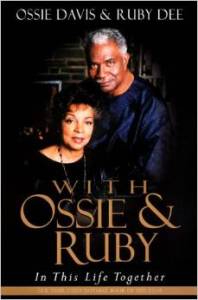 “We need to take our children back and replace the negative forces around them with compassion for some of life’s most urgent agendas, such as education and world peace,” said Dee, a longtime breast cancer survivor.
“We need to take our children back and replace the negative forces around them with compassion for some of life’s most urgent agendas, such as education and world peace,” said Dee, a longtime breast cancer survivor.
That shared passion was also part of the secret sauce that kept Ruby Dee and Ossie Davis together for a half-century, when so many other couples in entertainment seem to last a half-minute. They truly lived up to the title of their memoir, “In This Life Together,” which Dee has said will be part of the epitaph on an urn holding their ashes.
Yanick Rice Lamb, who teaches journalism at Howard University, is co-founder and publisher of FierceforBlackWomen.com
Activism was part of Ruby Dee’s fiber. Dee didn’t “join” the Civil Rights Movement; she was “born” into it, she explains in this clip from the Archive of American Television video series on legends.

